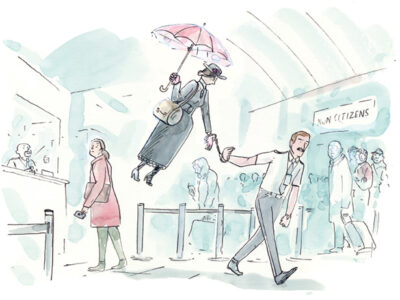
Reminiscences of World War I in Bohemia.
By Vladimir J. Fewkes | Earlier this year—the centenary of the First World War—Penn Museum assistant archivist Eric Schnittke came across a manuscript titled “A War-Scattered Family” while fulfilling a research request. Although it bears an anonymous byline, all indications are that the author was Vladimir Jaroslav Fewkes Gr’30, a native of Bohemia (in what is now the Czech Republic) who taught in Penn’s anthropology department while earning his doctorate, and later worked as a research associate at the Museum. The 16-page typewritten document, fragments of which appear below in minimally edited form, presents itself as the “factual” story of a family “who found themselves, circumstantially, on the wrong side of the fence.” It paints a vivid picture of just how thoroughly the Great War transformed life in a “typical” central Bohemian town, and the fortunes of a family who, as reluctant subjects of the Austro-Hungarian Empire, were drawn into it on the ill-fated side of the Central Powers—Germany, Austria-Hungary, Bulgaria, and the Ottoman Empire. A PDF of the manuscript in its entirety can be downloaded here.
Christmas Eve, 1913. In a typical “Middletown” of central Bohemia, within the walls of a mediaeval homestead, the family of a self-made merchant prepared for a joyous evening. Around a candle-lighted, candy-laden spruce tree, the group eagerly gathered for games, contests, and superstitious omens. Grandmother, quite in accordance with custom, directed the procedure.
The girls wanted to know who would be first to marry the following year. The boys were eager to find out whether they would remain home or depart. Hurriedly, the girls each selected a piece of the Christmas cake, while the boys collected old shoes. In the meantime, the candles were ready for reading. Each member of the family had socketed one in a holder and all were lighted simultaneously. As they flickered out, one by one, so would the lives of their lighters, in like sequence. Gruesome? No, just a custom. It was plainly apparent that grandmother’s candle would flicker out ahead of the rest. “Just a silly superstition,” remarked father.
The daughters had each placed a piece of cake under the Christmas tree, and our cat was brought in. The (presumably) hungry animal was now expected to rush forth and grab one of the offerings: its owner would be the first to marry the following year. Alas, our cat did not even approach the tree. The girls coaxed, pushed, begged, all in vain: Chicha was not interested. Owing to the mischievous conspiracy of the three brothers, the spirited feline had feasted royally throughout the day on his favorite delicacies. What a pity! Two such lovely potential brides must now wait another full year.
Nobody could tamper with old shoes, so the boys were safe. They could rely on the signs of the shoes, which were twirled by the lace and thrown over the right shoulder, so as to land before the door. If the toe points out, he will leave; but heel toward the door means that he remains at home. Both of the elder brothers cast “out.” One of the boys was to study abroad; for the other there were no plans. What was the meaning, then? Much manifestation of affection followed, which was ended abruptly by a strident shriek. The Christmas tree had caught fire. A sturdy arm hurled the blazing spruce out the window into a snow bank, candy and all. Grandmother mused: “This is surely a serious sign; it implies a calamity. I see much trouble ahead, indeed a world catastrophe: war!”
Christmas Eve, 1914. Little, very little to be joyous over. Grandmother was buried but a few days before. The eldest son had not been heard from since August, and in the meantime, “the enemy” had made several deep advances. Fortresses originally thought impregnable fell like frail shacks, numbers of the missing mounted daily, and the anticipated “speedy end” of the bloody horror seemed nowhere in sight. There was no incentive to arrange a festive dinner while a host of men were suffering out in the open, including one member of the family. The other, we knew, had reached a neutral land.
1916. The Central Powers had strengthened their positions, and were seemingly victorious on all sides. Internally, a ruthless iron hand held the suspected element at bay through censorship, arrest, and martial law. The majority of the Bohemian leaders, unless they were fortunate enough to escape into Switzerland, were either under close scrutiny, or else in prison. Newspapers came out with blank columns. They had to glorify, of course, the deeds of “our” armies, and belittle those of the Allies. It was well known that whole regiments composed of anti-Austro-German men had marched across the line of the “enemy,” and immediately joined the Legions then well established both in Russia and France.
The introduction of the merchant’s youngest son to the “christening by fire” inspired him with but one thought: Surrender at the first opportunity. But that was no easy matter, for the members of the company were marked as political suspects. Those who tried and failed were in full view upon the barbed wire just before the trenches. To inflict a wound upon oneself meant a garrison, if not the noose. In short, the outlook was bleak. Our youngest, however, found a promising opportunity quite unexpectedly. Replacing a fallen buddy on a night patrol, he saw a chance to get lost. Accordingly, he capitalized on the situation. First he made certain that his hand grenades were in ample number to end all in case of a fiasco—for he preferred this to being stretched over the wires. Not knowing the nature of the terrain and the positions of the flanks, he concluded that a bee-line forward might lead to success. Departing from the squad under the pretense of ailing, he rushed through a deserted trench, climbed a hill, and surveyed the situation. The front was quiet; the forest seemed deadly silent. Rifle in hands, hand grenades hanging from the belt, our intended deserter progressed with caution. Presently, he recognized sounds, but he could not comprehend the language. Finding adequate protection in a thicket, he waited. The voices came nearer, he pricked his ear—a foreign tongue. He affixed a bit of bandage to the end of his bayonet, quickly closed the caps of his hand grenades, and moved forward to meet the group. They in turn became aware of his presence.
He proceeded to surrender by sticking the bayonet into the ground, and began to remove the hand grenades. The enemy group, however, were not in agreement with such action. A mutually intelligible tongue was soon struck and it was revealed that both sides had the same intention. War, after all, is equally unpleasant and dangerous on either side of the line. The enemy group was also surrendering. Outnumbered, our youngest had no choice; the 32 rifles sealed the argument. A bargain was agreed upon, and a mutual pledge was given to tell an acceptable story of capture. And somehow it worked, for the original patrol of which our youngest was a member never came back. Nine men lost; 32 prisoners taken. Not so bad, thought the commanding officer. Indeed, the brave act deserves recognition. Within a week, an iron cross was pinned on the brave youngster.
Saint Anne’s Day, 1918. Four years have gone, and the war still on. The family of the merchant took to the forest for the afternoon. The girls had packed sundry morsels for a picnic, took their crochet work along, and the parents carried letters and cards from their scattered sons to read again. It was a beautiful day. There were very few people in the forest and everything was so calm—conducive to forgetting, for a spell at any rate, the miseries of the time. In the late afternoon a spot was selected for the meal near a deserted hunter’s shack. Here the contents of baskets were spread and the family heartily began its repast.
“Pssst, Psst. Mary, this is Bill—Bill Jonas, don’t you remember? Your neighbor’s son. I am in the shack. Is it safe to come out? Your little brother is here, too.”
Hurriedly, the surroundings were reconnoitered and found safe. Bill appeared, then another boy, a stranger. “Your son,” said Bill, “is down the cellar, ill. We have deserted, the three of us reached this place last night. We have gone through hell, over a thousand miles, mostly on foot, many detours, avoiding cities, begging for food—say, may I have a piece of bread?” Bill grabbed some food, stuck several pieces into his pockets, and the parents and the two boys went down the cellar. There, on the damp floor, with a thin coat under him and a rag covering, was Sonny.
The greatest problem was to cover up the presence of Sonny and to banish suspicion of outsiders. A place was improvised in the attic, and just as everything seemed to be going well, with Sonny recovering strength, a tip came from friends that the house was to be raided. The only hope of refuge was offered by the underground passage (of mediaeval origin) which could be entered from the cellar. Equipped with a first aid kit, ample food for several days, candles, matches, even cigarettes, Sonny made his retreat and the entrance into the passage was carefully blocked. The tip proved to be correct, for in the late afternoon several gendarmes arrived, accompanied by local police. While the police helped materially to confuse the gendarmes, the family managed to feign complete surprise.
Time went on and the subterranean life became quite a chore. The boys craved some relaxation, and in September, they thought that their safety was well assured. Not satisfied with the gardens of the two houses, they decided to venture out into the open. The chief attraction was the dance given by a group of their buddies now on leave—and that was too good to miss. Their liberty was indeed brief, for a government inspector had to be present at the dance, and the two army deserters, not being forewarned, were readily spotted. Promptly, they were placed in the local jail.
Sonny was returned back to the front, properly labeled as to his past record. This time, he found himself on the Italian line. There was very little doing, except wholesale desertion and self-inflicted wounds. Indeed, a revolution was in progress, and by the middle of October, no one seemed serious about war.
The front was cracking in several spots. By the end of October, Sonny, amid a motley group of soldiers, fought his way back from the Italian front through hostile hinterland toward the Bohemian border. On the 27th, the group arrived in the capital, and the following day, with independent Czechoslovakia publicly proclaimed (exactly ten days after the Philadelphia manifesto), Sonny was home. This time, however, he did not have to resort to the cellar. The town needed patrolling, and men with military equipment were few. He helped to organize a unit, mustered several veterans, helped to scour the woods for deserters, and within a few days joined a company to go to Slovakia to occupy the eastern portion of the newly born republic. The war was over—the revolution was on.




